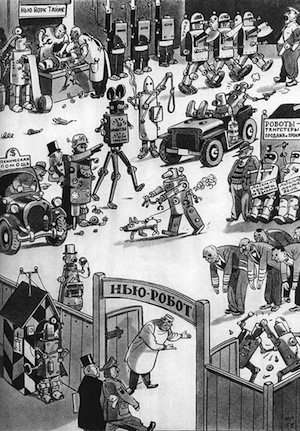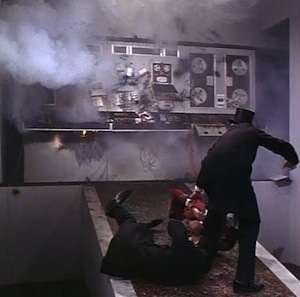The Rise and Fall of Cybernetic Communism
The Soviets, the cyberneticists, and the SNAFU Principle

Here's a damned interesting story in Nautilus about the Soviets and the cyberneticists. When Norbert Wiener first conceived of cybernetics, Slava Gerovitch writes, the initial official reaction in the USSR was to blast the concept, with propagandists who had never even read Wiener attacking his ideas in steadily more hysterical terms. (One writer derided "semanticists-cannibals" who think "a larger part of humanity must be exterminated.") This posed a problem for the country's technologists, who understood that they couldn't keep up with the West's advances in computing if they ignored cybernetics.
So they had to tread delicately:
One had to avoid using any suspicious cybernetic terms. Even the phrase "logical operations" was risky, because it might be interpreted as implying that machines could think. Instead of "computer memory," researchers used the more neutral, technical term, "storage." "Information" was replaced by "data," and "information theory" by the convoluted expression "the statistical theory of electrical signal transmission with noise." A joke about Stalin's henchman, Beria, who was responsible for the nuclear weapons program, became popular. Beria comes to his boss and asks permission to use the notorious field of cybernetics for military purposes. Stalin puffs on his pipe and says, "Okay, but just please make sure the other Politburo members don't find out."
After Stalin's death, the situation started to reverse itself, and by the '60s cybernetics was a trendy topic in Moscow. The Communists became convinced that it could help them overcome the knowledge problems that always dog central planners—and the CIA, watching from Washington, agreed:
In a remarkable pre-Internet vision, researchers proposed to link together all Soviet enterprises through a unified national computer network which would process economic information in real time and optimize the entire economy. The proposal caused serious alarm among CIA analysts, who began to suspect that cybernetics was becoming too powerful a tool in the hands of the Soviet government. They raised concern with the Kennedy administration, and in October 1962 Arthur Schlesinger, Jr., President Kennedy's special assistant, wrote a memo in which he gloomily predicted that the "all-out Soviet commitment to cybernetics" would give the Soviets "a tremendous advantage." Schlesinger warned that, "by 1970 the USSR may have a radically new production technology, involving total enterprises or complexes of industries, managed by closed-loop, feedback control employing self-teaching computers." A special expert panel was set up to investigate the Soviet cybernetic threat.
What Schlesinger may not have appreciated is the degree to which the Soviet establishment was appropriating cybernetics for the purpose of maintaining their administrative hierarchies, and resisting reform….The centrally planned Soviet economy was poorly prepared for computerization. Its cumbersome bureaucracy was too slow to implement rapid changes in production and distribution, and it was ruled by industrial ministries which, like separate fiefdoms, did not want to share their information or decision-making power. Each ministry therefore created its own information management system, disconnected from and incompatible with the others. Instead of transforming the top-down economy into a self-regulating system, bureaucrats used their new cybernetic models and computers to protect their power. Expensive and largely useless information management systems were strewn across the country.

By the '80s, the system was producing about 800 billion documents per year, all of which "still had to pass through narrow channels of centralized, hierarchical distribution, squeezed by institutional barriers and secrecy restrictions. Management became totally unwieldy. To get an approval for the production of an ordinary flat iron, for example, a factory manager had to collect more than 60 signatures. Technological innovation became a bureaucratic nightmare." The SNAFU Principle kicked in as well: "Big Brother, who wanted to see everything and know everything, became overwhelmed with information that was often distorted by lower-level officials trying to present a rosy picture. Vast clogs of inaccurate information paralyzed the decision-making mechanism, while accurate information was exchanged only locally, like black-market goods or forbidden books in the samizdat."
To read the whole article, go here.
Editor's Note: As of February 29, 2024, commenting privileges on reason.com posts are limited to Reason Plus subscribers. Past commenters are grandfathered in for a temporary period. Subscribe here to preserve your ability to comment. Your Reason Plus subscription also gives you an ad-free version of reason.com, along with full access to the digital edition and archives of Reason magazine. We request that comments be civil and on-topic. We do not moderate or assume any responsibility for comments, which are owned by the readers who post them. Comments do not represent the views of reason.com or Reason Foundation. We reserve the right to delete any comment and ban commenters for any reason at any time. Comments may only be edited within 5 minutes of posting. Report abuses.
Please to post comments


...the "all-out Soviet commitment to cybernetics" would give the Soviets "a tremendous advantage."
Mr. President, we cannot allow a central planning gap.
I wish we have one o' them Doomsday Machines...
I love how the economically-illiterate quickly assume that cybernetics could solve the calculation problem if only the bureaucracy was willing and efficient and the infrastructure was modern, fast and innovative.
"So, yeah, it was a good thing those Ruskies were all a bunch of peasants!" - Gen. 'Buck' Turgidson.
Which makes Ken McLeod's 'Fall Revolution' series' Deus Ex Machina switch to worldwide socialism even more laughable - its predicated on a major revolution in computing technology.
In Soviet Russia, something something YOU
In Soviet Russia, Internet surfs YOU!
So I see, Yakov Smirnoff is just continuing the long Russian tradition of amzingly funny jokes.
That bit about JFK et al freaking out over the computer gap would be amusing if it weren't all too common. Reminds me of Reagan hating communism and thinking he had to help push it over the edge with military spending. If, instead, he had actually believed in the inferiority of central planning and collectivism, he would have reduced military spending and let the markets beef up the US economy far faster than the Soviets could have matched.
I wish we could have politicians who actually believed in free markets, but then they wouldn't be politicians and we wouldn't have such a coercive government, which all are as attractive to Top.Men as lights are to moths.